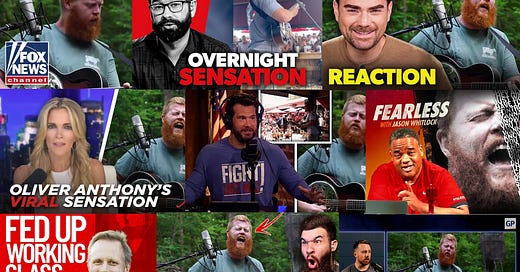The hype machine's favorite son
Is Oliver Anthony "fake"? Probably not - but the media buzz around him is a different story.
I knew there was something contrived about Rich Men North of Richmond as soon as he started talking about money. Richmond, 2023’s late-summer country music anthem for every middle-to-upper-class suburban Republican you’ve ever met, has been hailed by an endless parade of GOP pundits and operatives as Oliver Anthony’s authentic wail of the South’s suffer…
Keep reading with a 7-day free trial
Subscribe to Carl Beijer to keep reading this post and get 7 days of free access to the full post archives.





